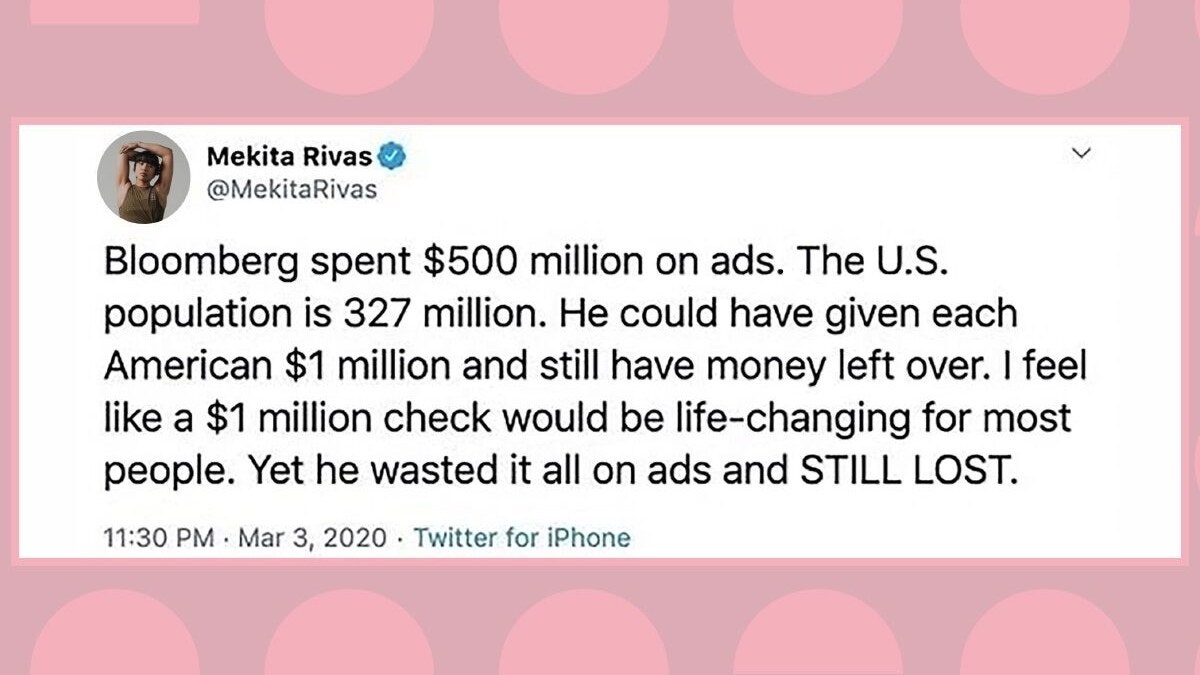I Write About Viral Moments. Then I Became One

“I am contributing to your honeymoon fund on behalf of Michael Bloomberg,” he wrote. “Thank you for embarrassing the rest of us UNL School of Journalism grads.”
I know I messed up. That’s why I deleted the tweet: to prevent the spread of my miscalculation. It wasn’t just that it was personally humiliating—it was also plain wrong. I acknowledged it, and I tried to mitigate it. But the internet is not a place where you can have a brain freeze, make a dumb math mistake, and just live with the embarrassment. You must be shamed for daring to display your humanity. And if you’re a woman—especially a woman of color—that shame will arrive in the form of attacks on your identity and intelligence.
I lost count of the number of messages I received telling me to “go back to school,” as if one public math error negates my entire educational history and two college degrees. Many called into question my journalistic ability. “Look who she writes for,” one person remarked, aghast that I could have a successful career and have the audacity to be imperfect at the same time.
While the rest of the world may be shuffling onto the next viral moment, I am not afforded the opportunity to carry on as quickly. In this day and age—filled with an endless supply of memes and TikToks—we often fail to realize that the viral moment doesn’t end when we’re no longer entertained by it. Those who lived it must move forward in the real world, even if their viral persona remains forever frozen in time in the digital world.
After going viral, there is debris to pick up and clear. I still haven’t resurfaced on Twitter or unprotected my tweets, though that may change by the time this story is published. I have thousands of follower requests to sort through (I suspect many are trolls and/or bots). Eventually, I’ll need to put my website back up.
Every now and then I’m hit with a paralyzing fear: Will I ever live this down? I worry this one tweet will now come to define my legacy; that my tombstone is now fated to say, “Here rests Mekita. She could string words together, but boy was she bad at math.”
I know that’s letting the negativity and noise get to me. And although this experience illustrated how terrible people can be, it also revealed how unbelievably kind they can be, too. Occasionally as I waded through all those antagonistic messages, I’d come across rays of sunshine. “Hang in there,” several people remarked. Another said: “I wanted to reach out to let you know two things: one, you’re not alone and two, this will pass.” I nearly burst into tears.
Becoming a cultural talking point is bizarre. So much of it is out of your control. Once it happens, there’s no reset button. I thought deleting a tweet would prevent this whole debacle, but I was also severely underestimating my own reach. I will be much more deliberative about what I share and post online in the future.
But chief among all the lessons I’ve learned is this: There will always be people who think they know everything about you, probably based on little to no information. But the only person who knows you best is you. And no amount of viral notoriety can change that.
Mekita Rivas is a writer based in Washington, D.C. She regularly covers culture, style, travel, and wellness.



